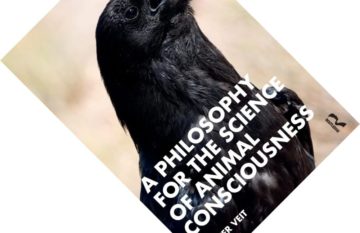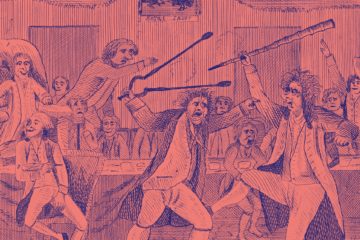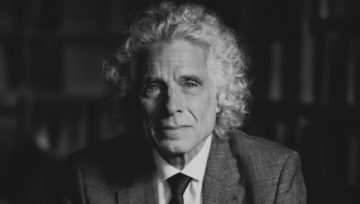Category: Recommended Reading
Why The Godfather of A.I. Fears What He’s Built
Joshua Rothman at The New Yorker:
 Geoffrey Hinton, the computer scientist who is often called “the godfather of A.I.,” handed me a walking stick. “You’ll need one of these,” he said. Then he headed off along a path through the woods to the shore. It wound across a shaded clearing, past a pair of sheds, and then descended by stone steps to a small dock. “It’s slippery here,” Hinton warned, as we started down.
Geoffrey Hinton, the computer scientist who is often called “the godfather of A.I.,” handed me a walking stick. “You’ll need one of these,” he said. Then he headed off along a path through the woods to the shore. It wound across a shaded clearing, past a pair of sheds, and then descended by stone steps to a small dock. “It’s slippery here,” Hinton warned, as we started down.
New knowledge incorporates itself into your existing networks in the form of subtle adjustments. Sometimes they’re temporary: if you meet a stranger at a party, his name might impress itself only briefly upon the networks in your memory. But they can also last a lifetime, if, say, that stranger becomes your spouse. Because new knowledge merges with old, what you know shapes what you learn. If someone at the party tells you about his trip to Amsterdam, the next day, at a museum, your networks may nudge you a little closer to the Vermeer. In this way, small changes create the possibility for profound transformations.
more here.
The two Chomskys: The US military’s greatest enemy worked in an institution saturated with military funding. How did it shape his thought?
Chris Knight in Aeon:
 When I first came across Chomsky’s linguistic work, my reactions resembled those of an anthropologist attempting to fathom the beliefs of a previously uncontacted tribe. For anyone in that position, the first rule is to put aside one’s own cultural prejudices and assumptions in order to avoid dismissing every unfamiliar belief. The doctrines encountered may seem unusual, but there are always compelling reasons why those particular doctrines are the ones people adhere to. The task of the anthropologist is to delve into the local context, history, politics and culture of the people under study – in the hope that this may shed light on the logic of those ideas.
When I first came across Chomsky’s linguistic work, my reactions resembled those of an anthropologist attempting to fathom the beliefs of a previously uncontacted tribe. For anyone in that position, the first rule is to put aside one’s own cultural prejudices and assumptions in order to avoid dismissing every unfamiliar belief. The doctrines encountered may seem unusual, but there are always compelling reasons why those particular doctrines are the ones people adhere to. The task of the anthropologist is to delve into the local context, history, politics and culture of the people under study – in the hope that this may shed light on the logic of those ideas.
The tribe shaping Chomsky’s linguistics, I quickly discovered, was a community of computer scientists during the early years of the Cold War, employed to enhance electronic systems of command and control for nuclear war and other military operations. My book Decoding Chomsky (2016) was an attempt to explain the ever-changing intricacies of Chomskyan linguistics within this specific cultural and historical setting.
More here.
Is modern food lower in nutrients?
Bárbara Pinho in Chemistry World:
 When we think about the food we ate when we were younger, we might be inclined to say that it was tastier and healthier than what we eat today. And while we may be saying this out of a nostalgic tendency, researchers have been looking for a more scientific answer. In several papers, researchers have used food tables – country-by-country compendia of historical information on the mineral composition of foods – to report an apparent decline in micronutrients such as iron, vitamins and zinc in fruit and vegetables over time.
When we think about the food we ate when we were younger, we might be inclined to say that it was tastier and healthier than what we eat today. And while we may be saying this out of a nostalgic tendency, researchers have been looking for a more scientific answer. In several papers, researchers have used food tables – country-by-country compendia of historical information on the mineral composition of foods – to report an apparent decline in micronutrients such as iron, vitamins and zinc in fruit and vegetables over time.
More here.
Who’s afraid of Al-Andalus?
Elizabeth Spragins at Public Books:
 Construction of the mosque-cathedral of Córdoba began in the late 8th century under the first Umayyad emir of Córdoba, ʿAbd al-Raḥmān I, and then later expanded several times during the 9th and 10th centuries. From its inception, the mosque—with its red-and-white-striped arches—was built to resemble the Great Mosque of Damascus, on the other side of the Mediterranean. But the mosque went through a more local transformation in the 16th century, by which point Catholic Spain had driven out the Muslims who had inhabited the south for seven centuries. Now, the mosque was renovated into a cathedral, with a large transept and choir added to its center. Seeing the Christian addition to the nearly thousand-year-old structure, Emperor Charles V allegedly remarked: The architect has taken something extraordinary and made it ordinary.
Construction of the mosque-cathedral of Córdoba began in the late 8th century under the first Umayyad emir of Córdoba, ʿAbd al-Raḥmān I, and then later expanded several times during the 9th and 10th centuries. From its inception, the mosque—with its red-and-white-striped arches—was built to resemble the Great Mosque of Damascus, on the other side of the Mediterranean. But the mosque went through a more local transformation in the 16th century, by which point Catholic Spain had driven out the Muslims who had inhabited the south for seven centuries. Now, the mosque was renovated into a cathedral, with a large transept and choir added to its center. Seeing the Christian addition to the nearly thousand-year-old structure, Emperor Charles V allegedly remarked: The architect has taken something extraordinary and made it ordinary.
More here.
Bernard Carr – Why Did Consciousness Emerge?
Tuesday Poem
The Creation Story
I’m not afraid of love
or its consequence of light.
It’s not easy to say this
or anything when my entrails
dangle between paradise
and fear.
I am ashamed
I never had the words
to carry a friend from her death
to the stars
correctly.
Or the words to keep
my people safe
from drought
or gunshot.
The stars who were created by words
are circling over this house
formed of calcium, of blood
this house
in danger of being torn apart
by stones of fear.
If these words can do anything
if these songs can do anything
I say bless this house
with stars.
Transfix us with love.
by Joy Harjo
from How we Became Human
W.W. Norton & Company, 2002
David Byrne Isn’t Himself. Or Any Self, Really
David Marchese in The New York Times:
 Every year is probably an interesting one for an artist as restless and inquisitive as David Byrne, but I’m willing to bet that 2023 was especially so. In September, a newly restored edition of “Stop Making Sense,” the landmark 1984 concert film by Byrne’s former band, Talking Heads, returned to theaters to much (richly deserved) ballyhoo. Before that, “Here Lies Love,” a musical based on the life of the former Philippine first lady Imelda Marcos, began a five-month run on Broadway. That show featured lyrics by Byrne and music written by him and Fatboy Slim, and was staged in such a way that a regular old theater was transformed into a shape-shifting disco. The film is a rock concert as joyous celebration of community; the musical a seductive portrait of power’s distorting effects. “Rather than be told this is what the world can be like,’’ says Byrne, 71, about his work, “it’s kind of like, ‘We’re going to show to you how things could be.’ ”
Every year is probably an interesting one for an artist as restless and inquisitive as David Byrne, but I’m willing to bet that 2023 was especially so. In September, a newly restored edition of “Stop Making Sense,” the landmark 1984 concert film by Byrne’s former band, Talking Heads, returned to theaters to much (richly deserved) ballyhoo. Before that, “Here Lies Love,” a musical based on the life of the former Philippine first lady Imelda Marcos, began a five-month run on Broadway. That show featured lyrics by Byrne and music written by him and Fatboy Slim, and was staged in such a way that a regular old theater was transformed into a shape-shifting disco. The film is a rock concert as joyous celebration of community; the musical a seductive portrait of power’s distorting effects. “Rather than be told this is what the world can be like,’’ says Byrne, 71, about his work, “it’s kind of like, ‘We’re going to show to you how things could be.’ ”
It was a little surprising to me to see how strong the enthusiasm still is for “Stop Making Sense.” People really have an emotional connection to that film. But do you? What do you feel when you watch it?
It’s almost as if I’m watching a character. I’m a little removed. I retain elements of that person but not all of him. It’s like, Oh, what is the connection between me and that being that I’m looking at?
More here.
What are farm animals thinking?
David Grimm in Science:
 DUMMERSTORF, GERMANY—You’d never mistake a goat for a dog, but on an unseasonably warm afternoon in early September, I almost do. I’m in a red-brick barn in northern Germany, trying to keep my sanity amid some of the most unholy noises I’ve ever heard. Sixty Nigerian dwarf goats are taking turns crashing their horns against wooden stalls while unleashing a cacophony of bleats, groans, and retching wails that make it nearly impossible to hold a conversation. Then, amid the chaos, something remarkable happens. One of the animals raises her head over her enclosure and gazes pensively at me, her widely spaced eyes and odd, rectangular pupils seeking to make contact—and perhaps even connection.
DUMMERSTORF, GERMANY—You’d never mistake a goat for a dog, but on an unseasonably warm afternoon in early September, I almost do. I’m in a red-brick barn in northern Germany, trying to keep my sanity amid some of the most unholy noises I’ve ever heard. Sixty Nigerian dwarf goats are taking turns crashing their horns against wooden stalls while unleashing a cacophony of bleats, groans, and retching wails that make it nearly impossible to hold a conversation. Then, amid the chaos, something remarkable happens. One of the animals raises her head over her enclosure and gazes pensively at me, her widely spaced eyes and odd, rectangular pupils seeking to make contact—and perhaps even connection.
It’s a look we see in other humans, in our pets, and in our primate relatives. But not in animals raised for food. Or maybe we just haven’t been looking hard enough.
That’s the core idea here at the Research Institute for Farm Animal Biology (FBN), one of the world’s leading centers for investigating the minds of goats, pigs, and other livestock. On a campus that looks like a cross between a farm and a small research institute—with low-rise buildings nestled among pastures, stables, and the occasional dung pile—scientists are probing the mental and emotional lives of animals we’ve lived with for thousands of years, yet, from a cognitive perspective, know almost nothing about.
More here.
Sunday, December 10, 2023
After Melville
Andrew Schenker in The Baffler:
 Writing in 2005, Andrew Delbanco observed, in his critical biography Melville: His World and Work, that the author of Moby-Dick “seems to renew himself for each new generation.” Since the mid-twentieth century, Delbanco notes, “there has been a steady stream of new Melvilles, all of whom seem somehow able to keep up with the preoccupations of the moment.” He lists a few:
Writing in 2005, Andrew Delbanco observed, in his critical biography Melville: His World and Work, that the author of Moby-Dick “seems to renew himself for each new generation.” Since the mid-twentieth century, Delbanco notes, “there has been a steady stream of new Melvilles, all of whom seem somehow able to keep up with the preoccupations of the moment.” He lists a few:
myth-and-symbol Melville
countercultural Melville
anti-war Melville
environmentalist Melville
gay or bisexual Melville
multicultural Melville
global Melville
And then there’s his deathless creation, Ahab, the man who, per Elizabeth Hardwick, “has no ancestor in literature other than all of literature.” Inspired in part, Delbanco speculates, by former vice president and staunch slavery defender John C. Calhoun, the Pequod’s monomaniacal commander has been likened to everyone from Hitler to the nuclear scientists responsible for the atomic bomb to, inevitably, Donald Trump. (Unless, in a reading popular in right-wing media, Trump is actually the white whale and the Democrats who impeached him are Ahab.)
More here.
A Philosophy For The Science Of Animal Consciousness
Leon Vlieger at The Inquisitive Biologist:
 The nature of consciousness is one of the hardest problems in biology. What exactly is it? Where did it come from? And are non-human animals conscious? Philosophers and scientists range from ascribing consciousness to all life (biopsychism), or even all matter (panpsychism), to attributing it exclusively to humans. Seemingly beyond the purview of empirical science due to its subjective nature, there is a lack of “intuitively attractive solutions” (p. xiii). In the opinion of Walter Veit, an assistant professor in philosophy, that just will not do. In this slim but advanced-level book, he outlines a mightily interesting thesis of how consciousness could have gradually evolved, which aspect of it likely appeared first, and why we urgently need to step away from taking human consciousness as our yardstick.
The nature of consciousness is one of the hardest problems in biology. What exactly is it? Where did it come from? And are non-human animals conscious? Philosophers and scientists range from ascribing consciousness to all life (biopsychism), or even all matter (panpsychism), to attributing it exclusively to humans. Seemingly beyond the purview of empirical science due to its subjective nature, there is a lack of “intuitively attractive solutions” (p. xiii). In the opinion of Walter Veit, an assistant professor in philosophy, that just will not do. In this slim but advanced-level book, he outlines a mightily interesting thesis of how consciousness could have gradually evolved, which aspect of it likely appeared first, and why we urgently need to step away from taking human consciousness as our yardstick.
More here.
Democracy in the Real World
Thad Williamson in the Boston Review:
 Danielle Allen’s Justice by Means of Democracy represents a major, and much-needed, shift in perspective. In the book, she locates the work of establishing justice not in the philosophy seminar room but in real-world discussions with diverse, everyday people: “talking with strangers” with intention to co-create a more democratic and more just society together. Fifty years on from Rawls’s foundational A Theory of Justice, Allen has set out to articulate not simply a new theory of justice but a new way of thinking about justice: one that trades Rawls’s abstract thought experiments for real-life ones. And equally importantly, it offers us the concrete tools for getting from thinking about to practicing democracy, however imperfectly, in messy situations in which the needs and future prospects of real people are concretely implicated.
Danielle Allen’s Justice by Means of Democracy represents a major, and much-needed, shift in perspective. In the book, she locates the work of establishing justice not in the philosophy seminar room but in real-world discussions with diverse, everyday people: “talking with strangers” with intention to co-create a more democratic and more just society together. Fifty years on from Rawls’s foundational A Theory of Justice, Allen has set out to articulate not simply a new theory of justice but a new way of thinking about justice: one that trades Rawls’s abstract thought experiments for real-life ones. And equally importantly, it offers us the concrete tools for getting from thinking about to practicing democracy, however imperfectly, in messy situations in which the needs and future prospects of real people are concretely implicated.
More here.
The Mystery of Beethoven’s “Immortal Beloved”
Emily Zarevich at JSTOR Daily:
 It’s one of the great mysteries of music history, as high in the ranks as “Who wrote the Renaissance lover’s tribute ‘Greensleeves’” and “How did Amadeus Mozart really die?” In eighteenth- and early nineteenth-century Europe, correspondence was a private means of communication, and some clandestine love affairs conducted in secret succeeded in evading confirmation from even the most determined detectives. Which is why the world is still wondering, centuries after the question was first asked, “Who was Beethoven’s ‘Immortal Beloved?’”
It’s one of the great mysteries of music history, as high in the ranks as “Who wrote the Renaissance lover’s tribute ‘Greensleeves’” and “How did Amadeus Mozart really die?” In eighteenth- and early nineteenth-century Europe, correspondence was a private means of communication, and some clandestine love affairs conducted in secret succeeded in evading confirmation from even the most determined detectives. Which is why the world is still wondering, centuries after the question was first asked, “Who was Beethoven’s ‘Immortal Beloved?’”
More here.
Denny Laine (1944 – 2023) Musician, Founder of Moody Blues and Wings
Jane Wodening (1936 – 2023) Artist
Ryan O’Neal (1941 – 2023) Actor
Sunday Poem
The Bostonian Reading Amichai
In our house, no one was taught
to argue with God. So how could I
disbelieve my nightlight, resist
my pink-and-blue picture books,
or the dove on top of the Christmas tree?
All the glistening meats and cakes
might vaporize, and bedtime stories
unwrite themselves, give over
to bad dreams. I never knew
there was a tradition of despair
in other households, or any need
for salvation. Nothing exact
ever called to me. Even now,
bewildered by the state of the world,
of my life, I don’t rage
as other women do. Neither
do I have their faith. I don’t argue
with God how none of it makes sense.
That’s simply how it is—
like the original blur at the edge of light
the nightlight casts.
by Pamela Stewart
from Infrequent Mysteries
Alice James Books 1991
Hipster coffee enthusiasts have taken the joy out of coffee
Joy Saha in Salon:
 Coffee is multifunctional: For some, like me, it’s a morning necessity. For others, it’s a once in a while indulgence. And for a select few, it’s a sugary treat — something that’s more akin to dessert than mandatory fuel.
Coffee is multifunctional: For some, like me, it’s a morning necessity. For others, it’s a once in a while indulgence. And for a select few, it’s a sugary treat — something that’s more akin to dessert than mandatory fuel.
Regardless of what purpose coffee serves for you, the beverage is at its crux pleasurable. There’s nothing like stopping by at your local coffee shop, grabbing a beverage and reveling in that first sip. In a world where global atrocities continue to make headlines and the onset of another debilitating pandemic doesn’t seem like a far-fetched concept, coffee provides a bit of a reprieve.
That, however, has been tainted by hipster cafes: swanky spots with fancy barista gadgets, beans sourced from an array of exclusive locations (like coffee excreted from civet cats found on the islands of Bali!), and a menu that’s shorter than my weekly grocery list. If the unconventional coffee isn’t enough to grab your attention, the eye-catching aesthetic certainly will. Such cafes are either riddled with minimalistic decor or filled with a superfluous amount of plants and wacky artwork.
More here.
“There’s Nothing Mystical About the Idea that Ideas Change History”
Matt Johnson in Quillette:
 Quillette: In Enlightenment Now, you discuss the importance of “norms and institutions that channel parochial interests into universal benefits.” Jonathan Haidt says the nation is the largest unit that activates the tribal mind, whereas Peter Singer says we are on an “escalator of reason” that allows our circle of moral concern to keep expanding. What would you say are the limits of human solidarity?
Quillette: In Enlightenment Now, you discuss the importance of “norms and institutions that channel parochial interests into universal benefits.” Jonathan Haidt says the nation is the largest unit that activates the tribal mind, whereas Peter Singer says we are on an “escalator of reason” that allows our circle of moral concern to keep expanding. What would you say are the limits of human solidarity?
Steven Pinker: I agree that the moral imperative to treat all lives as equally valuable has to pull outward against our natural tendency to favor kin, clan, and tribe. So we may never see the day when people’s primary loyalty will be to all of Homo sapiens, let alone all sentient beings. But it’s not clear that the nation-state, which is a historical construction, is the most natural resting place for Singer’s expanding circle. The United States, in particular, was consecrated by a social contract rather than as an ethnostate, and it seems to command a lot of patriotism.
And while there surely is a centripetal force of tribalism, there are two forces pushing outward against it. One is the moral fact that it’s awkward, to say the least, to insist that some lives are more valuable than others, particularly when you’re face-to-face with those others. The other is the pragmatic fact that our fate is increasingly aligned with that of the rest of the planet. Some of our parochial priorities can only be solved at a global scale, like climate, trade, piracy, terrorism, and cybercrime. As the world becomes more interconnected, which is inexorable, our interests become more tied up with those in the rest of the world. That will push in the same direction as the moral concern for universal human welfare.
More here.
Saturday, December 9, 2023
Becoming Ella Fitzgerald
Chris Vognar at the LA Times:
 The title of “Becoming Ella Fitzgerald,” Judith Tick’s incisive, doggedly researched new biography of the 20th century’s preeminent songstress, suggests action and movement. This is no accident. As Tick writes, “across her entire career, the artist was always ‘becoming Ella Fitzgerald.’”
The title of “Becoming Ella Fitzgerald,” Judith Tick’s incisive, doggedly researched new biography of the 20th century’s preeminent songstress, suggests action and movement. This is no accident. As Tick writes, “across her entire career, the artist was always ‘becoming Ella Fitzgerald.’”
Her reign began as a swing singer with the great bandleader and drummer Chick Webb; took on a bop tenor as she fell under the influence of Dizzy Gillespie; and blossomed into refined pop elegance with her remarkable run of songbook albums produced by Norman Granz. She could irk the jazz purists and confound the supper club set. But for more than 60 years, to paraphrase a male peer who weaves in and out of this narrative, she did it her way. Tick, a professor emerita of music history at Northwestern University, proves an ideal guide to Fitzgerald’s perpetual progress. She translates what she hears with lyrical clarity, describing the “honey-mustard blend” of Fitzgerald and Louis Armstrong’s voices on their classic duets.
more here.
